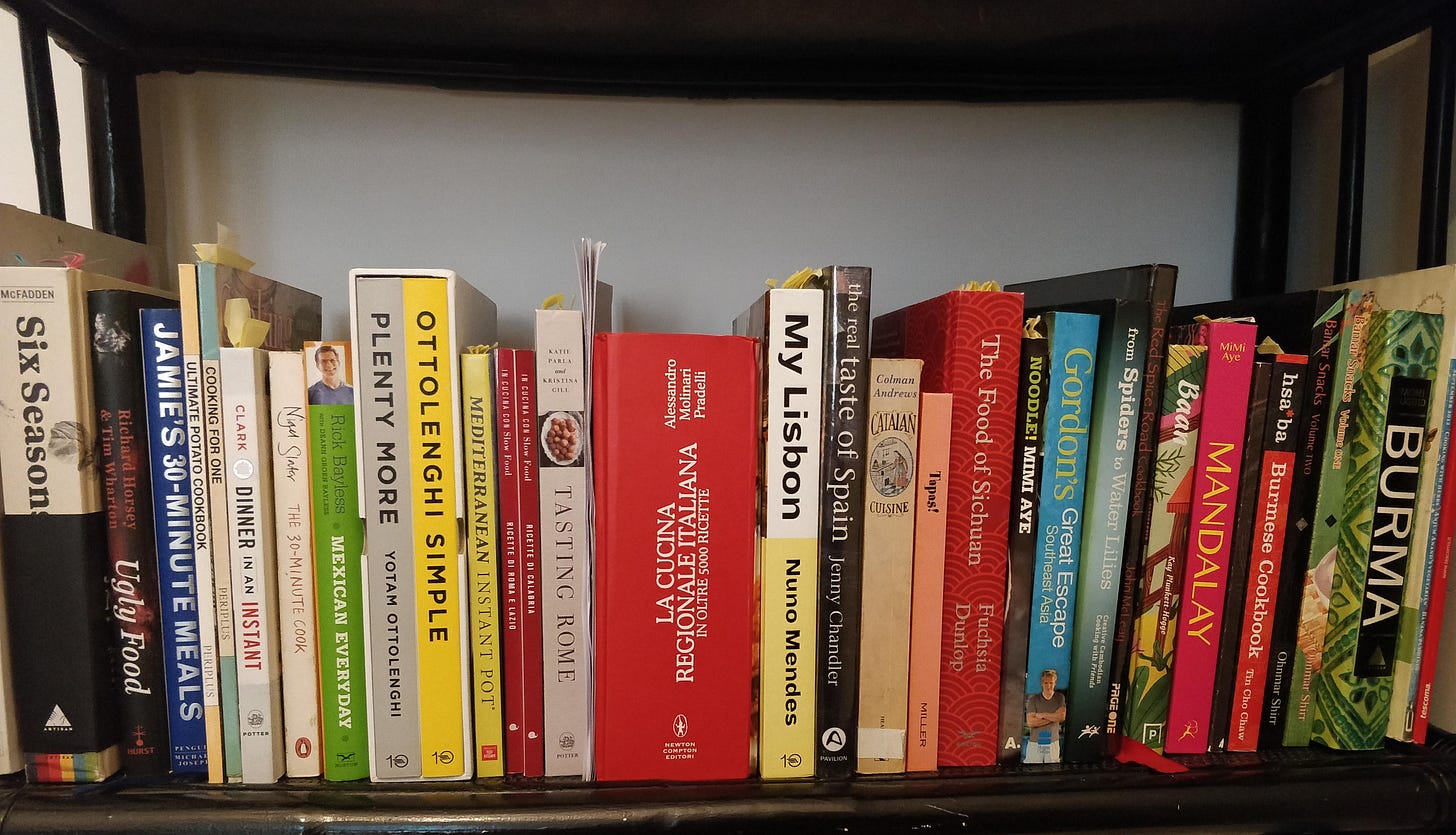Thin’s Pickings - Book Edition
Because we need good books to get through the dark times
Thin Ink turned 4 this week! Where did all these years go?
When I penned my first Thin Ink piece, I had no idea what the future would hold, only the conviction that this is one of the most important issues of our time and that I wanted to keep writing about it. I’m very thankful I’ve been able to do that.
Thin Ink has also evolved, while staying (mostly) true to the strapline: “food, climate, and where they meet”: from snippets of the latest research and reports to longer musings, interviews with cool folks, and guest essays. There will be more of the latter in the coming months, so please stay tuned.
Of course, I couldn’t have made it without you: the people who actually read a nerdy newsletter about food systems and gives me valuable feedback and support, especially when I put my neck out like I did last week. Thank you so much!
And a very warm welcome also to new subscribers. A hundred or so of you found me over the past 10 days and I’m not sure how or where, but I’m grateful and hope you find the content interesting. If you are brand new to food systems, my first issue for 2025 could be a nice icebreaker.
Last week, I criticised a well-intentioned letter from 153 winners of the Nobel Prize and World Food Prize as myopic and misleading. But one of the things I failed to do was scrutinise the make-up of the signatories.
Thankfully, Stuart Gillespie, a veteran food systems researcher and author of the upcoming book Food Fight, has done that work for us and I feel it sheds some light on why some issues got prominent space in the letter and others were omitted.
Thanks, Stuart!
Where do I begin with how horrifying this week has been in terms of the news coming out of the States, including news that would affect pretty much all of us sharing this earth, not just those living there? Perhaps I shouldn’t even try.
I will instead do two things:
Share the wise words of John Amaechi, someone whose fascinating CV and work elude easy categorisation.
His post is very much about what’s happening in the U.S. of A but I think applicable also to many living under increasingly unequal and uncaring societies.Share the seven books I managed to read last year that both educated and touched me deeply.
Mind you, these aren’t easy reads, but they’re worth it. I usually don’t have a problem jumping from one serious book to another, but when I occasionally find myself needing something light in between, I go back to my two trusted and beloved authors: Agatha Christie and Georgette Heyer. Or Ursula La Guin (although that’s not light).
Personally, I find a good meal and a good book to be salves to my bruised soul. Since I always write about food, let me focus on books this week.
A Day in the Life of Abed Salama: Anatomy of a Jerusalem Tragedy - Nathan Thrall
This is a devastating and incredibly human take on a topic that has been covered extensively, especially over the past year, but through an incident that occurred more than a decade ago: a deadly collision between a school bus filled with Palestinian kindergarteners and their teachers and an 18-wheeler, also driven by a Palestinian.
The book helps us see the characters, all linked to that terrible tragedy in one way or another, as fully-formed humans with contradictions and triumphs and heartbreaks, like every single one of us, while weaving the indignities of living as a Palestinian under Israeli-occupied West Bank in vivid and heartbreaking detail.
No wonder it won the 2024 Pulitzer Prize for “General Nonfiction”. I do have a small quibble: I wish there were fewer characters.
Barons: Money, Power, and the Corruption of America's Food Industry - Austin Frerick
In my June 2024 interview with Austin, an expert on agricultural and antitrust policy, I wrote that he “has written - wait for it - a rollicking book on how monopolies and monopsonies are ruining America’s food system and what can be done to reverse the situation”.
He managed to make antitrust issues interesting to ordinary people, using statistics that make you sit up, like how pigs in Iowa outnumber human residents by a ratio of more than seven to one.
Given how cosy the new U.S. administration seems to be with oligarchs and industry titans (despite its pretence to care for the people), this is a timely book reminding us why we need more, not less, antitrust action. I just wish there were more books that scrutinise similar companies in the rest of the world.
Braiding Sweetgrass: Indigenous Wisdom, Scientific Knowledge and the Teachings of Plants - Robin Wall Kimmerer
I’ve waxed lyrical about this book to anyone who would listen and even wrote an issue this summer, reflecting what I’d learnt from the book with what I was witnessing around me: wildfires raging in our holiday destination and a particularly destructive hailstorm hitting our home city, all in the same week, all in the same country.
This book is nearly five years old but its lessons are timeless. The idea of a “honourable harvest” where reciprocity and sustainability trump short-term profits and a culture where plants and animals are a who, not an it, will forever stay with me.
The writing is beautiful and detailed - sometimes too lyrical, I find - and it made me see the science of plants in a completely new way and appreciate indigenous wisdom more than ever before.
Everyone who is gone is here: The United States, Central American, and the Making of a Crisis - Jonathan Blitzer
An epic and evocative book that links the U.S.’s decades-long meddling in South America, particularly the mollycoddling of some of the region’s most vicious dictators, with the “War on Drugs” and the “immigration crisis”, both of which has been repeatedly weaponised for political gain.
It is utterly gripping, with characters that are richly sketched and events that are recounted in minute detail, beginning in El Salvador half a century ago to the foreign and immigration policies of the Obama, Trump, and Biden years. I actually burst into tears when I got to a part of the book that involved a family that has endured so much heartbreak. But here, too, I wish there were fewer characters.
If you’re wondering what;s next for U.S. border politics in 2025, this piece by my Lighthouse Reports colleague Melissa Del Bosque is worth a read. In a few pithy paragraphs, she explained how they got to where they are now.
On the Shadow Tracks: A Journey through Occupied Myanmar - Clare Hammond
I don’t know the cause of the obsession Brits have with rail journeys but I’m grateful for Clare’s curiosity that took her to different parts of my home country. She did this despite persistent attempts by the military regime to make her travels as inconvenient as possible, sometimes through labyrinthine officialdom and other times by sheer incompetence.
In Myanmar, railways are associated with authoritarianism, oppression, and death. Villagers, including women and children, were forced to work, for free, under threat of torture or worse, to build the tracks. Clare delved into all this and more, including the role her own country - Britain - had played as the colonial master.
Clare also wrote a Global Witness report on illegal rare earth mining in Myanmar. Here’s an interview I did with her in 2023 about the report.
Some People Need Killing: A Memoir of Murder in My Country - Patricia Evangelista
I remember when Rodrigo Duterte came to power in the Philippines. My Filipino friends and colleagues fretted about his rise, but their friends and loved ones accused them of being elitist, because they pointed out Duterte’s foul and sexist language, his pledge to kill drug users, and his open support for vigilante attacks.
So reading this book, which has received multiple accolades, was heartbreaking (for all the lives lost) and infuriating (for the blatant abuses, the collusion by the general public, and the unfairness of life in general) in equal measure.
I also keenly felt Patricia’s sense of bewilderment with her own brethren. I felt the same when the Rohingya massacres happened in Myanmar. Perhaps some of our American friends are feeling the same. To misquote Star Wars… This is how democracy dies, with thunderous applause.
Waiting to be Arrested at Night: A Uyghur Poet’s Memoir of China’s Genocide - Tahir Hamut Izgil
This book is the perfect example that brilliant, heart-wrenching writing doesn’t need complex words or complicated structures. It has such simple prose but written so beautifully and vividly that you can feel the emotions jumping off the page.
I felt the same despair the writer felt when the net closed in on him, I felt the same helplessness he felt when friends and family disappeared and they had to leave, and I felt the same unmooring he must have felt when friends and family back home started distancing themselves. Due credit must also go to translator Joshua L. Freeman for his role in bringing Tahir’s work to the wider audience.
This powerful account of what it’s like to be an Uyghur in modern-day China was the winner of the 2024 Moore Prize for Human Rights Writing, whose jury I had the privilege to be part of. Patricia’s book, mentioned above, received an Honourable Mention.
If you want to read more, here’s an interview with Tahir and Joshua about the book and their experiences.
Thin’s Pickings - Myanmar Edition
Full disclosure: Myself and a local data consultancy mentored the teams behind the top two stories and we cannot be prouder of what great jobs they’ve done to keep the world informed about what’s happening in Myanmar.
All three are from The New Humanitarian, an award-winning online outlet that is still consistently putting out stories on Myanmar.
Why the name Pyusawhti is sowing fear in central Myanmar - The New Humanitarian
Insightful piece by local news outlet Myaelatt Athan about pro-junta militias called “Pyusawhti”, named after an 18th-century warrior prince known for his mythical powers, that are terrorising villages in the country’s heartland.
In Myanmar, healthcare and disease prevention are neglected casualties of war - The New Humanitarian
This one, by another local news outlet Delta New Agency, shows the rapid deterioration of healthcare in post-coup Myanmar, with infectious diseases soaring in the wake of conflict and economic malaise.
Hidden jungle hospital treats Myanmar’s war-wounded amid junta airstrikes - The New Humanitarin
A photo essay by an Italian journalist on the impacts of the horrors of war in a small corner of eastern Myanmar.
As always, please feel free to share this post and send tips and thoughts on bluesky @thinink.bsky.social, mastodon @ThinInk@journa.host, my LinkedIn page, or via e-mail thin@thin-ink.net.








Thanks for these recommendations! Much needed
Here's to 4 more years (and to lots of good things hopefully happening along the way)